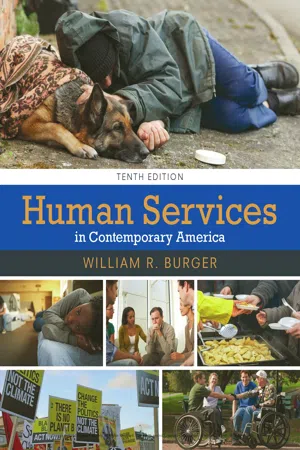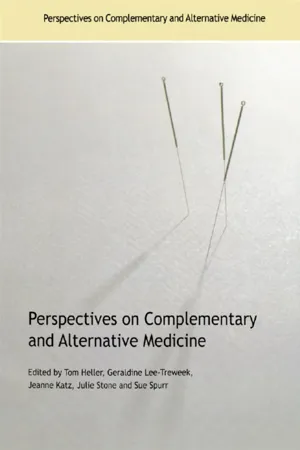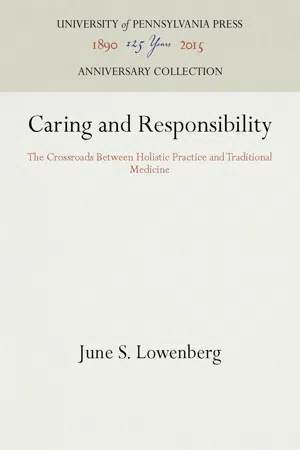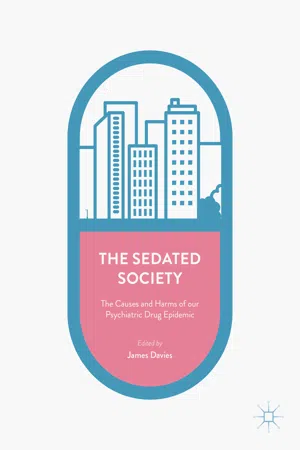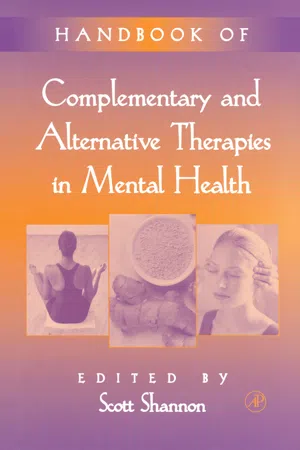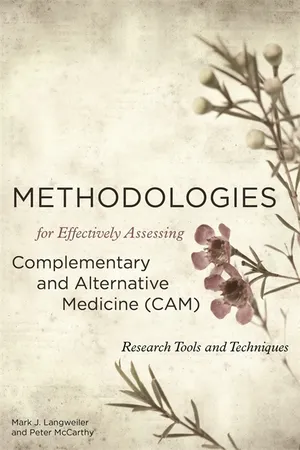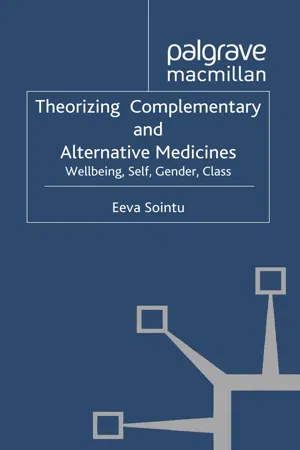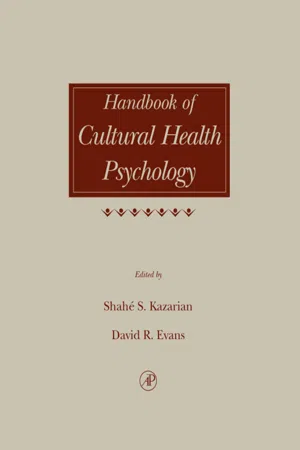Psychology
Alternatives To The Medical Model
"Alternatives to the Medical Model" refers to approaches in psychology that challenge the traditional view of mental health as solely a medical issue. These alternatives emphasize social, cultural, and environmental factors in understanding and addressing mental health concerns. They advocate for a more holistic and inclusive approach that takes into account the individual's unique experiences and context.
Written by Perlego with AI-assistance
Related key terms
1 of 5
10 Key excerpts on "Alternatives To The Medical Model"
- eBook - PDF
- William Burger(Author)
- 2017(Publication Date)
- Cengage Learning EMEA(Publisher)
WCN 02-300 THEORETICAL PERSPECTIVES 173 So many other alternative approaches are available—such as homeopathic medicine, Hindu methods of healing, and aromatherapy—that it is not possible to detail them all here. Critics have conceded that some of the alternative methods have been proven to be effective, but they maintain that others may have dubious value in regard to a particular disorder. It is up to the consumer to carefully evaluate the evidence pertaining to a particular therapy before getting involved with it. The holistic trend in medicine may provide the means of reconciling the medical model with the human services model. This is because the holistic approach recog-nizes the importance of environmental factors in human disorders. On a practical level, the acceptance of alternative methods of healing will mean a greater role for nonmedical therapists in the treatment of physical illnesses. Schools of Therapy The perspectives most commonly used in group and individual approaches to psychological problems are the psychoanalytic, the humanistic, and the behavioris-tic schools, or systems, of therapy. A “school” in this context is a group of workers who study certain disorders and use similar methods of study. Although the mem-bers of a school may disagree about various points, they share certain basic ideas about the causes of psychological disorders. These basic beliefs, in turn, dictate their approach to helping. Psychoanalytic Viewpoint The development of psychoanalysis is very much associated with Sigmund Freud and his followers. Actually, many of Freud’s insights, such as the idea of the uncon-scious mind, had already been discovered by others (Murray, 1988). There is no doubt, however, that Freud was responsible for shaping psychoanalysis into a coher-ent system of thought. Under Freud’s direction, psychoanalysis became one of the influential movements of modern times. - Tom Heller, Geraldine Lee-Treweek, Jeanne Katz, Julie Stone, Sue Spurr(Authors)
- 2005(Publication Date)
- Routledge(Publisher)
Mental health, and indeed mental ‘illness’ or ‘distress’, is a contested area, as illustrated by the range of ways in which various interest groups consider and may attempt to influence or change mental processes. Although the biomedical approach seems to be the dominant force in contemporary western society, many ‘alternative’ concepts are becoming increasingly accepted. Indeed, in the world of complementary and alternative health there are many, diverse ways in which users and advocates conceptualise and attempt to tackle mental distress. It is difficult to characterise any single philosophical approach that underpins all CAM modalities. For example, some energy practitioners (such as reiki practitioners or spiritual healers) are not necessarily interested in the notion of mental illness and tend to work with the energy imbalances they believe they could find, rather than with any formal medical diagnosis. The reason for this lack of interest revolves around philosophical beliefs that place issues of energy over and above formal labels. Energy practitioners may not recognise labels such as ‘mentally ill’ and ‘mentally well’. Instead they believe that everyone is somewhere on a spectrum at different stages of their lives and, therefore, medical diagnoses and categories do not make sense. In the diverse world of complementary and alternative medicine many people who have experienced severe, and maybe even life-challenging, bouts of mental distress have found a CAM approach that has helped them. For example, Rosalind Caplin recovered from severe anorexia:I decided to see a homeopath. I continued the homeopathic treatment for many years, finding my energy and vitality gradually increasing, as did my self-confidence. My experiences with the homeopath were similar to that of my counsellor—time and space to talk, respect and acknowledgement. My label was not considered in the remedy—which was given on the basis of my overall personal makeup, my emotional, physical and energy states at the time. I was treated as an individual—a response far removed from the psychiatric one, which still considered me to be abnormal.(Caplin, 1996 , p. 145)It is important not to imply a false dichotomy between current orthodox forms of mental health practice and holistic or complementary and alternative approaches. Indeed, the practice of mental health workers in the National Health Service (NHS) has been characterised by their increasing ability to adapt and incorporate some of the wider concepts of mental health that feature strongly in the CAM movement. Current ‘conventional’ or ‘orthodox’ forms of mental health work may, in fact, be more ‘holistic’ than they are sometimes stereotypically portrayed, especially when treating ‘common’ forms of mental distress. Anxiety and various manifestations of low mood may be considered more amenable to holistic approaches than the more severe forms of mental distress, such as bipolar disorders or psychotic illnesses such as ‘schizophrenia’.Many service users make comments about the detached, impersonal approach common in psychiatry. They believe psychiatrists are narrowly preoccupied with medical interpretations of emotional distress (see Box 5.1- eBook - PDF
Caring and Responsibility
The Crossroads Between Holistic Practice and Traditional Medicine
- June S. Lowenberg(Author)
- 2016(Publication Date)
This approach, which encom-passes and is at times indistinguishable from humanistic, be-havioral, and integral medicine, includes an appreciation of patients as mental and emotional, social and spiritual, as well 16 The New Model as physical beings. It respects their capacity for healing them-selves and regards them as active partners in, rather than passive recipients of, health care. (James S. Gordon, M.D., formerly at NIMH [Gordon, 1980:3]) Many Americans, particularly in the urban centers of the West and East coasts, have become increasingly interested in a vari-ety of health practices grouped under the rubric of holistic health or holistic healing, or, sometimes, holistic medi-cine. Some of these practices are ancient, derived from Chi-nese and Indian medical and religious systems. Others, such as biofeedback, are the products of modern psychological re-search. Still others are derived from folk and primitive healing systems and from marginal healing systems, such as chiropractic and homeopathy. What binds these diverse prac-tices together is a philosophy of health—a way of viewing the person in a particular environment as a whole person who may be afflicted with disease. (Phyllis H. Mattson [Mattson, 1982:1]) The phenomenon of holistic health at times refers to a social move-ment, at other times to a set of treatment techniques, and at times to a core set of beliefs and a way of approaching health, illness, and heal-ing. To further complicate the problem of definition, the meanings and approaches labelled holistic health often overlap, or are used inter-changeably, with models called wholistic medicine, behavioral medicine, humanistic medicine, comprehensive or client-centered medicine, psy-chosomatic medicine, integral medicine, and alternative health care (Gordon, 1981:114; Benson, 1979:viii; Frank, 1981:1; Fink, 1976:23; Jaffe, 1980:5). - eBook - PDF
The Sedated Society
The Causes and Harms of our Psychiatric Drug Epidemic
- James Davies(Author)
- 2017(Publication Date)
- Palgrave Macmillan(Publisher)
Where individual therapy is needed, effective, formulation-based (and therefore individu- ally tailored) psychological therapies should be available to all. All such therapies should be evidence-based and delivered by quali- fied, competent professionals. Decisions about what therapy or thera- pies should be offered to whom should be based on a person’s specific problems and on the best evidence for the effectiveness of the interven- tion, not on the diagnosis. Individual formulations should be used to put together an individualised package of care for each person’s unique set of problems. Using psychological therapies as part of a psychosocial, rather than biomedical, approach would significantly change the way clinical psychologists and others work. Our psychiatric colleagues would play an important medical role within this overall psychosocial ethos. Their role would be analogous to those of general practitioners, public health physi- cians and doctors who offer their expertise to athletes. We Should Offer Care Rather than Coercion When people are in crisis, residential care may be needed, but this should not be seen as a medical issue. Since a ‘disease model’ is inappropriate, it is also inappropriate to care for people in hospital wards; a different model of P. Kinderman 297 care is needed. As with other services, residential units should be based on a psychosocial rather than a medical model. Residential social workers or nurses who have retrained in a psychosocial approach (and possibly with a more appropriate professional title) are likely to be best placed to lead such units. The nature of extreme distress means medical colleagues may well be valuable members of the team, but again their role should be as consultants to the team, rather than automatically as leaders of the team. The need for compulsory detention would be much reduced within this new approach. - Scott Shannon(Author)
- 2002(Publication Date)
- Academic Press(Publisher)
For example, many individuals find healing of mental/emotional disorders from factors that lie well outside the psychotherapeutic or psychopharmacological models. Whether it is a new pet, a supportive friendship, an exciting romance, a pleasurable hobby, a spir- itual deepening, a selfless service, a life-threatening illness, or an inexplica- ble personal epiphany, people come upon healing via a multitude of paths and methods. In addition, if we step outside our own narrow cultural view, we can also see that cross-cultural approaches to healing offer relief to many and have for eons. Some of these methods step outside the box that Jerome Frank (1961) out- lined for us 40 years ago. The examples listed above do not involve healers; there is no placebo response or suggestion involved. In some ways, this chal- lenges our profession, perhaps creating defensiveness or resistance or even eliciting a puffed-up, they can't heal without me response. Yet when we look honestly at our lives and our experiences, professional healing stands as just one path of many to healing and growth. Simply put, people are more complex than any current model of healing fully allows. Technically, neither the psychotherapeutic nor the psychopharma- cological model explains the impact of the other. In some ways, they are mutu- ally exclusive. However, if we can see that people function simultaneously on many different, interconnected levels (physical/biological, mental/emotional, and spiritual, for example), we can begin to grasp a solution to this modem dilemma. Neither model is wrong. They are merely reasonable models for an isolated, fragmentary view of human nature. Our physical/biochemical nature is real and can be affected by medication. Our mental/emotional self exists and it can be affected by therapy. Beyond this, we have a spiritual existence (honored by every major historical culture on earth) that can also affect change and illness.- eBook - ePub
Methodologies for Effectively Assessing Complementary and Alternative Medicine (CAM)
Research Tools and Techniques
- Peter W. McCarthy, BSc, McCarthy, BSc, PhD, Mark J. Langweiler, BA, DC, Langweiler, BA, DC, DAAPM(Authors)
- 2015(Publication Date)
- Singing Dragon(Publisher)
5 Using Psychosocial Models and Methods to Evaluate Complementary and Alternative Medicine Philip Harris, CPsychol, AFBPsS and Katie Thirlaway, PhD, CPsychol In this chapter we:• examine models of health that provide different conceptual frameworks for healthcare delivery and evaluation• argue that the biomedical approach to disease has led to major advances in healthcare but is not sufficient to meet the needs of people with long-term health conditions• propose the biopsychosocial model as a holistic alternative encompassing biomedical, genetic, environmental, psycho-social and lifestyle influences on health• suggest a biopsychosocial research paradigm as an appropriate conceptual framework for evaluating integrative approaches to healthcare• present the use of complementary and alternative medicine (CAM) as a positive lifestyle choice for people with long-term conditions that reflects their values and beliefs about health and wellbeing• identify three areas of psychosocial research that may yield fruitful results if incorporated into future CAM studies:1. the effect of CAM interventions on attitudes and beliefs and health behaviours2. the effect of CAM interventions on the ability of patients to manage long-term health conditions3. the relationship between the patient and professional and the effect of this on the outcome of CAM interventions.Models of Health and DiseaseMedical, psychological and sociological researchers into health and healthcare all agree that modern healthcare in the Western world was built on a biomedical model of disease that still remains the underlying principle behind mainstream healthcare practice (Scambler 2008). The biomedical model itself derives, at least partly, from germ theory which postulates that each disease has a single cause.1 - eBook - PDF
- James H. Lake(Author)
- 2011(Publication Date)
- Thieme(Publisher)
The problem of cate-gorizing medical practices according to a formal typology can be reduced to two tasks: identifying assessment or treatment approaches that have established mechanisms of action, and identifying approaches for which there is evidence of efficacy or effectiveness with respect to a particular symptom pattern. 20 Foundations and Methods of Integrative Mental Health Care For the purposes of this book, assessment and treatment ap-proaches are classified according to demonstrated or presumed underlying mechanisms of action mediating those effects and the level of evidence supporting claims of outcomes. Five logically distinct types of clinical approaches are used in mental health care: 1. Psychological—changing symptoms through psychotherapy 2. Biological—taking a substance with the goal of changing a presumed biological substrate of a symptom 3. Somatic and mind–body—manipulating or affecting the physical body or mind–body in a prescribed manner to yield generally beneficial effects 4. Uses of forms of energy or information that have been described or validated by current Western science, with the goal of changing general functions of the brain or body in beneficial ways 5. Uses of putative forms of energy or information that have not been validated by conventional Western science, with the goal of achieving generally beneficial changes With the exception of the last category, the above general kinds of clinical approaches apply to both conventional and nonconventional assessment and treatment methods, and are generally viewed as corresponding to levels of evidence for claims that a putative underlying mechanism of action is pres-ent or that a particular assessment or treatment method is verified or verifiable. - eBook - PDF
Existential Psychotherapy
A Genetic-Phenomenological Approach
- Daniel Sousa(Author)
- 2017(Publication Date)
- Palgrave Macmillan(Publisher)
MEDICAL MODEL AND CONTEXTUAL MODEL: A DICHOTOMOUS WORLD The history of psychotherapy has been marked by countless contro- versies, influenced by political, economic and social issues, which are connected to more specific questions of a scientific, academic and pro- fessional nature. The field is described as being divided into two great blocs: the medical model and the contextual model (Anderson et al. 2010). The medical model defends psychotherapies for specific diagnos- tic categories, known as empirically supported treatments (ESTs), where psychotherapy is scientifically validated on the sole basis of randomized clinical trials (RCT). It defends the manualization of psychotherapy based on specific techniques, regarded as engendering the processes of change that lead to cure. The contextual model believes that psycho- therapies that include a given number of factors will have successful outcomes, and that there is no justification for restricting clinical deci- sions and the type of intervention on the sole basis of the diagnostic cat- egory. It also believes that RCTs are just one way of validating empirical knowledge in psychotherapy and that, rather than focusing on specific techniques, it is more important to implement psychological interven- tions based on common factors. The arguments on both sides have been debated in detail and are still open today (Beutler et al. 2016; Wampold 2015; Wampold and Imel 2015; Laska et al. 2014; Asnaani and Foa 2014; Laska and Wampold 2014; Baker and McFall 2014; Lambert and 1 SCIENTIFIC RESEARCH INTO PSYCHOTHERAPY 7 Ogles 2014; Castonguay 2013; Norcross and Lambert 2011; Barlow 2004, 2010). However, detailed analysis of the literature looking at the complexity of the questions at stake shows that these questions cannot be easily separated from each other. - eBook - PDF
Theorizing Complementary and Alternative Medicines
Wellbeing, Self, Gender, Class
- E. Sointu(Author)
- 2012(Publication Date)
- Palgrave Macmillan(Publisher)
7 The Holistic Body and Mind how someone thinks, and what their opinions are and their belief systems are, these are in the body. And we can’t get into their mind so easily. So we work really with their body to con- tact their thinking. (Rebecca – a practitioner) In the wellbeing domain, ill health is frequently understood as a mat- ter transcending the biomedical emphasis on physiological symptoms. Forms of alternative medicine are, furthermore, argued to be differ- ent from conventional medicine because of the attention paid to the whole person: body, mind and spirit. The endeavour to address more than the biomedical body rests on conceptualizing individuals, in ill- ness and in health, holistically; people are understood as interconnected beings, complex creatures consisting of a body that is intertwined with a mind and, at times, with a spirit. Not only are the mind, the body and the spirit viewed as interlinked. Connections with the broader environment and other people are seen to matter as well. This holis- tic manner of conceptualizing a person is also often argued to generate more comprehensive insight into the causes, and cures, of illness. The holism espoused is situated in the broader context of understand- ings of the body and the mind historically; holism emerges from a cultural background where the body has long been coded negatively while the mind has been considered as that which defines humanity. Complementary and alternative health practices, however, destabilize traditional ideas of the silent body. The discourse of wellbeing brings the body to the centre of positive attention and care; the body that is massaged, soothed and cherished matters. Moreover, holism that defines the body as entwined with the mind and emotions, even the spirit, 149 150 Theorizing Complementary and Alternative Medicines bestows physical experience with significance and, at times, grants the body a voice. - eBook - PDF
- Shahe S. Kazarian, David R. Evans(Authors)
- 2001(Publication Date)
- Academic Press(Publisher)
Issues relating to quality of life, health care costs, and alternate approaches to traditional health care, however, have been of concern from both the biomedical and biopsychosocial perspectives on health. DEFINITION AND SCOPE OF PRACTICE Behavioral medicine, medical psychology, psychosomatic medicine, and health psychology are not synonymous terms. Medical psychology has a narrow focus and refers to traditional psychiatry in Great Britain, the practice of psy-chology in medical schools, or the study of psychological factors associated with Embracing the 21st Century 17 TABLE 1.4 Factors Associated with Growth of Health Psychology Evolving concept of health Limitations of the Western biomedical model Increased focus on chronic disease Emergence of Behavioral Medicine and Behavioral Health Increased concern with health determinants and illness prevention Increased concern with quality of life issues in health and illness Recognition of role of life styles in health and illness Health care costs Alternative medicine physical health, in addition to illness treatment at the individual, group, and sys-temic levels (Belar & Deardroff, 1995). Historically, psychosomatic medicine re-ferred to the unity of psyche–body relationships with the implication of psycho-logical causation of disease. There is an important distinction between the fields of behavioral medicine and health psychology, namely, the interdisciplinary ap-proach of behavioral medicine and the discipline-specific approach of health psy-chology to health. As pointed out by Belar and Deardroff (1995), psychology cannot “practice” behavioral medicine nor psychosomatic medicine. Health psy-chology, however, is one of several health care and basic science fields that con-tribute to the understanding of health and the consequent treatment, rehabilita-tion, and prevention strategies that evolve from such an understanding (Feuerstein et al., 1986).
Index pages curate the most relevant extracts from our library of academic textbooks. They’ve been created using an in-house natural language model (NLM), each adding context and meaning to key research topics.
